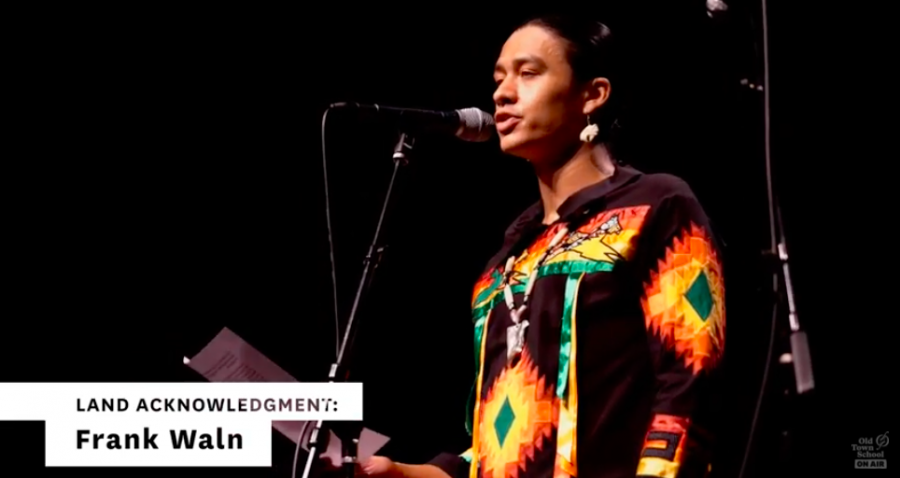Indigenous musicians virtually perform at second annual Indigenous Peoples’ Day Concert
Alex Perry/The Daily Northwestern
A screenshot of Frank Waln, Indigenous Peoples’ Day Concert headliner. He kicked off the evening with a land acknowledgement that recognized the homelands Chicago occupies.
October 13, 2020
A cohort of Indigenous musicians virtually performed in front of about 700 viewers across the nation at the second annual Indigenous Peoples’ Day Concert, co-hosted by Northwestern’s Center for Native American and Indigenous Research.
The Monday evening performance, which was streamed on YouTube, featured pre-recorded clips by musicians V4Loops, OPLIAM and headliner Frank Waln. The artists also talked between each performance on issues Indigenous communities historically and currently face.
Waln opened the concert with a land acknowledgement that recognized Chicago as sitting on the homelands of the Council of the Three Fires, and occupying the land of the Odawa, Ojibwa, Potawatomi, Miami, Ho-Chunk, Menominee and Sac and Fox nations.
The acknowledgment was followed by a performance by V4Loops, a trio consisting of Miguel Gonzales, Vladimir Garrido and Nicolas Muñoz. During their set, V4Loops performed a song called “Dancing and Playing,” which discussed global injustices against Indigenous peoples and how being educated about their history can promote unity.
Liam McDonald, founder of the concert and performer who goes by OPLIAM, continued the event by performing a new song titled “Down With the King.”
“It’s an ode to our facist dictator who will hopefully soon be out of office,” McDonald said.
OPLIAM also performed “Lungs on Fire,” which acknowledged the universal struggles that Indigenous peoples of America face, specifically Indigenous peoples native to the territory of Brazil and their experience “getting pushed off their land.”
McDonald said he believes there has been a lot of solidarity between Black and Indigenous peoples, underscoring the importance of the annual concert this year. Even amid the pandemic, McDonald felt they had to keep the momentum going.
“We thought it was imperative that we throw the concert this year,” McDonald said. “We’re celebrating the removal of the r-word from the NFL sports team and removal of the Columbus statues.”
Allison Conner (Communication M.S. ‘19), joined the concert team in its first year and now leads the marketing and fundraising for the event. Conner said she believes concerts that highlight Indigenous musicians will help deter the erasure of Indigenous history.
“Historically, Native people are very much invisible and our history is deleted,” Conner said. “This is a way to push back against the status quo and push back against a day that represents colonization.”
Concluding the concert, Waln’s set included songs titled “Concentration Camp Blues” and “Hope,” in which he rapped in Lakota.
The former is about the history behind reservations like the one he was born and raised on. His message was about the erasure felt by his community.
“They were concentration camps where my people were marched to die or ancestral land that tribes fought hard to protect and keep,” Waln said. “Our suffering never makes the news.”
Correction: A previous version of this story included a source’s mischaracterization of her role in planning the concert. She is a team member, not a co-founder. The Daily regrets the error.
Email: [email protected]
Twitter: @WhoisAlexPerry
Related Stories:
— Big Ten professors discuss supporting Indigenous communities, advancing Native American studies
— Evanston to replace Columbus Day with Indigenous Peoples’ Day
— With limited resources, Chicagoland Native American groups step up to help their own


